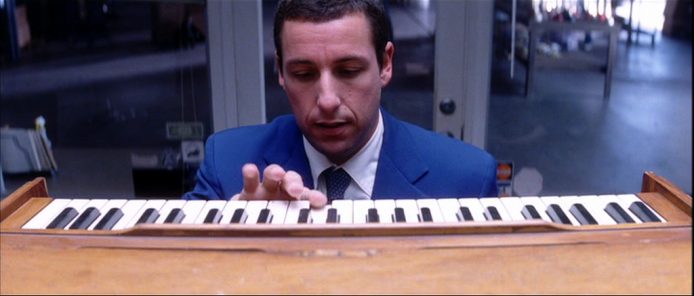Available on Blu-Ray now.
The film that became Adam Sandler’s career high point and the subsequent colossal millstone around his neck, Punch Drunk Love finds a depth beneath the frustrated man child he’d played so often before and to which he catastrophically reverted, peeling back the veneer and probing at the open nerves to see what actually makes him twitch.
Seen as something of an incongruous oddity amidst Paul Thomas Anderson’s canon of sprawling, multi-stranded ensemble pieces, the film is a simple story of a lonely man finding love. Sandler inhabits entirely his character of Barry Egan. A lone brother among eight children, his repression and isolation is shown to have been compounded by lifelong emotional abuse and sororal aggression. His inner rage occasionally bursts to the surface in sudden, shocking explosions of destruction. This inverts Anderson’s frequent theme of a lost soul seeking a surrogate family. Here, Barry’s driven into himself due to a surfeit of family.
Fortunately for Barry, when he meets Lena (Emily Watson), she acts as something of a gentle brake applied on his outbursts – a soothing emotional salve – and a channel to divert his bubbling passions in a more loving and placid direction. Watson plays Lena with a limitless serenity, her appearance in his life aptly coinciding with the appearance of a harmonium, mysteriously dumped at the side of the road.
Amidst sub-plots involving Barry’s extortion at the hands of a shady phone-sex line, and his distinctly odd attempt to earn a million frequent-flyer miles by purchasing industrial quantities of chocolate pudding, PDL is a tart-yet-sweet take on the classic romantic comedy. Unlike myriad other films of this ilk that ramp up the whimsy to unbearable levels, the quirky edge to the narrative feels like an ingrained part of the movie’s DNA. There is a deliberate other-worldliness, but remains within the realms of plausibility, which is necessary for Barry to remain empathetic.
True engagement with the film hinges on whether one can overlook the unlikely nature of the relationship between Barry and Lena. Barry is such a damaged and destructive character, that one could assume some level of mental illness on the part of Lena in her beatific acceptance of his wilder excesses, such as when they’re asked to leave a restaurant after he rips the restroom to shreds. Really, it’s a fairy tale; a brisk, compact wind down for Anderson after the daunting, emotionally draining Magnolia left him exhausting.
Optimistic in its outlook and sentimental of spirit, it’s a vehicle for Sandler that’s both revelatory in terms of the talent on display and damning in his immediate reversion to type afterwards; a slough of celluloid despond from which he’s never again emerged. It may remain a curious aberration in Paul Thomas Anderson’s body of work, but what a gorgeous freak it is.
